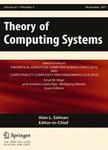版权所有:内蒙古大学图书馆 技术提供:维普资讯• 智图
内蒙古自治区呼和浩特市赛罕区大学西街235号 邮编: 010021

作者机构:Winphoria Networks Andheri 400093 Mumbai India Duke Univ Dept Comp Sci Ctr Geometr & Biol Comp Durham NC 27708 USA
出 版 物:《THEORY OF COMPUTING SYSTEMS》
年 卷 期:2002年第35卷第2期
页 面:189-215页
核心收录:
学科分类:07[理学] 0701[理学-数学] 0812[工学-计算机科学与技术(可授工学、理学学位)] 070101[理学-基础数学]
摘 要:External sorting-the process of sorting a file that is too large to fit into the computer s internal memory and must be stored externally on disks-is a fundamental subroutine in database systems [G], [IBM]. Of prime importance are techniques that use multiple disks in parallel in order to speed up the performance of external sorting. The simple randomized merging (SRM) mergesort algorithm proposed by Barve et al. [BGV] is the first parallel disk sorting algorithm that requires a provably optimal number of passes and that is fast in practice. Knuth [K, Section 5.4.9] recently identified SRM (which he calls randomized striping) as the method of choice for sorting with parallel disks. In this paper we present an efficient implementation of SRM, based upon novel and elegant data structures. We give a new implementation for SRM s lookahead forecasting technique for parallel prefetching and its forecast and flush technique for buffer management. Our techniques amount to a significant improvement in the way SRM carries out the parallel, independent disk accesses necessary to read blocks of input runs efficiently during external merging. Our implementation is based on synchronous parallel I/O primitives provided by the TPIE programming environment [TPI], whenever our program issues an I/O read (write) operation, one block of data is synchronously read from (written to) each disk in parallel. We compare the performance of SRM over a wide range of input sizes with that of disk-striped mergesort (DSM), which is widely used in practice. DSM consists of a standard mergesort in conjunction with striped I/O for parallel disk access. SRM merges together significantly more runs at a time compared with DSM, and thus it requires fewer merge passes. We demonstrate in practical scenarios that even though the streaming speeds for merging with DSM are a little higher than those for SRM (since DSM merges fewer runs at a time), sorting using SRM is often significantly faster than with DSM